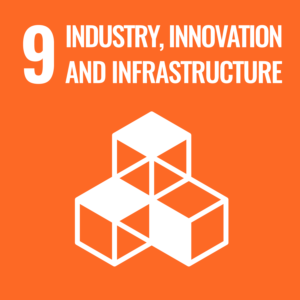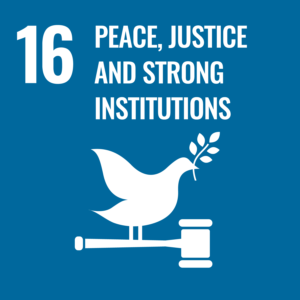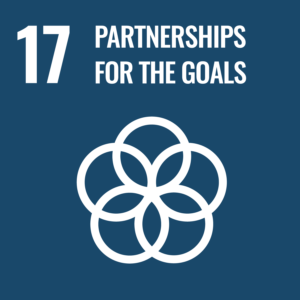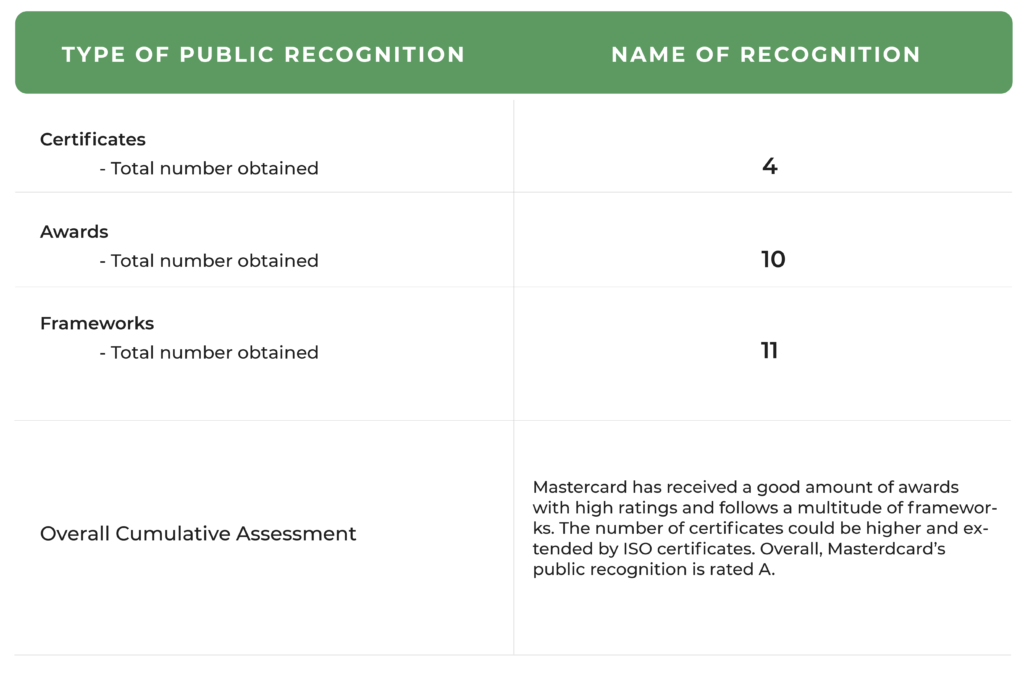
RATING

Positive
SECTOR
Financial Service Activities
Chief Sustainability Officer
Ellen Jackowski
Contact Details:
LinkedIn
Stock Exchange and Ticker
NYSE: MA
Website
Contact
T: 914-249-2000
E.mail: N/A
Listing
- Recognized by Ethisphere as one of the World’s Most Ethical Companies for the seventh consecutive year
- JUST Capital’s JUST 100 List (#13) and Industry Leader
Awards
- CDP Climate Change 2021, Score B
- CDP, Supplier Engagement, Score A
- 100% on Disability: Disability Equality Index (DEI) – Best Places to Work for Disability Inclusion
- 100% on Human Rights Campaign Foundation Corporate Equality Index – Best Places to Work for LGBTQ Equality
- Bloomberg’s Gender Equality Index
- DiversityInc’s Top 50 Companies for Diversity
- Dow Jones Sustainability North America Index
- Ethisphere’s World’s Most Ethical Companies
- FTSE4Good Index
- Won an innovation award from the Climate Leadership Conference for supplier engagement approach
Revenue
$18.884B
Market Capitalisation
$306.10B
Employees
24,000
Content source
Mastercard Sustainability Report
Evaluation of Mastercard
Over the last two years Mastercard has definitely improved its sustainability approach. The reporting has improved, clearly reports on SDG compliance and is third-party certified. Further, last time Mastercard had only one target at hand, but fortunately now it has many targets encompassing environmental, social and governance issues. It is commendable that it accelerated its net-zero commitment by 10 years, joined RE100 and has been 100% renewable since 2017, initially through the purchase of renewable-energy credits. Mastercard also created ESG Executive Steering Committee and tied executive compensation to ESG goals, including gender parity and financial inclusion. Overall, Mastercard’s sustainability performance is commendable and we wish more companies followed suit. Nevertheless, there is still some room for improvement if the company were to achieve A rating. We would advise to address sustainable material use and circular economy, and to focus on achieving its goals on time.
Sustainability Scorecard
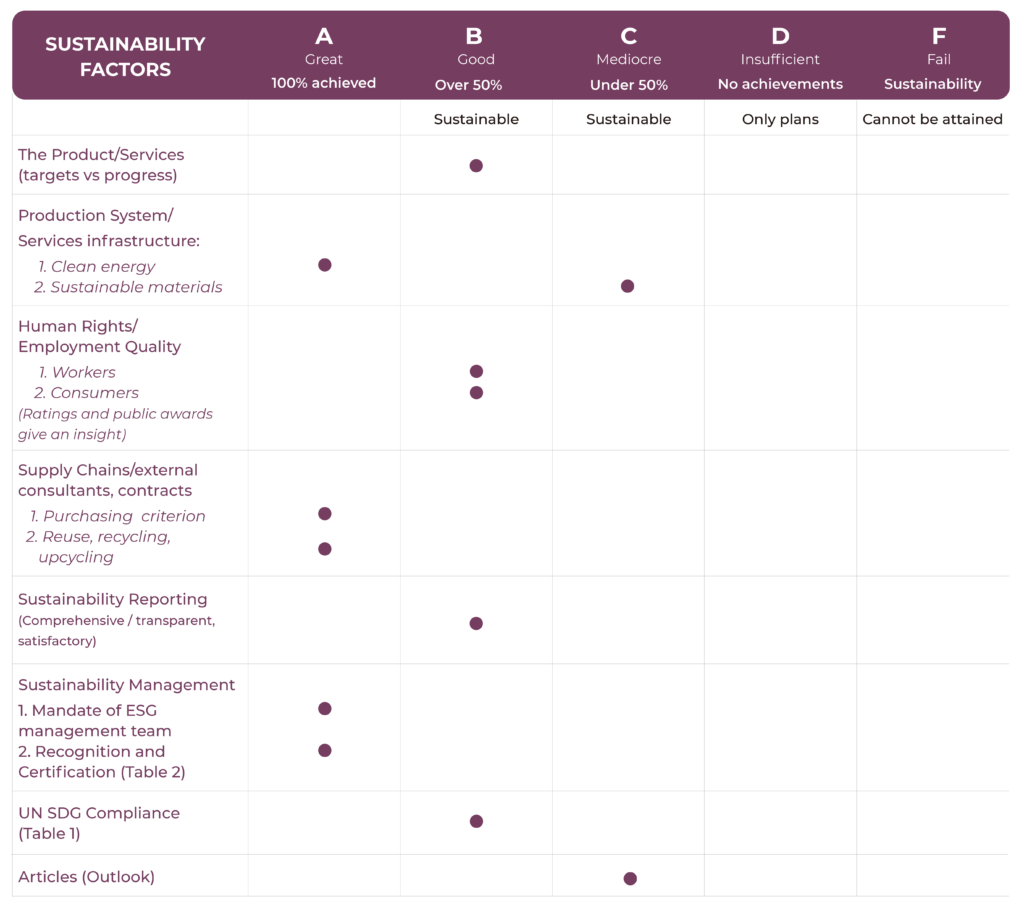
Mastercard Company Activity
Mastercard was originally founded in 1966 as the Interbank Card Association. The transformation to Mastercard occured from the coalition of a number of bankcard associations. Mastercard became a public company in 2006 and traded on the NYSE. The company has many sport sponsorships ranging from the MLB to PGA Tour to FIFA World Cup. Some of the newer developments from the corporation are “Mastercard Contactless”, QkR, and Banknet. Mastercard’s mission is to “work to connect and power an inclusive digital economy that benefits everyone, everywhere by making transactions safe, simple, smart and accessible. Using secure data and networks, partnerships and passion, our innovations and solutions help individuals, financial institutions, governments and businesses realize their greatest potential. [Their] decency quotient, or DQ, drives our culture and everything we do inside and outside of our company.”
Mastercard Sustainability Activity - As per company declarations
Sustainable and inclusive economic activity has never been more challenging or more necessary. At Mastercard, we are focused on connecting the “why” of our purpose to the “what” of our fundamental business strategy to ensure that we deliver long-term growth for our shareholders and contribute to a more equitable and prosperous world. And, we see the impact of our ESG activities playing out in three areas—PROSPERITY, PEOPLE and PLANET—all grounded in strong PRINCIPLES OF GOVERNANCE.
Certificate & Labels, Standards and Frameworks
- Global Reporting Initiative (GRI)
- Sustainable Accounting Standards Board (SASB)
- Task Force on Climate-Related Financial Disclosures (TCFD)
- General Data Protection Regulation (GDPR)
- All owned properties are LEED certified
- All global Mastercard locations achieved the Well Health Safety Seal in 2021
- Tech Hub achieved LEED Gold and Fitwel certification, showcasing wellness within the design, development and building operations
- The U.S. National Institute of Standards and Technology’s (NIST’s) Special Publication 800-115: “Technical Guide to Information Security Testing and Assessment”
- Open Web Application Security Project (OWASP) methodology
- Payment Card Industry (PCI) Security Standard
- Penetration Testing Execution Standard (PTES)
- International Organization for Standardization / International Electrotechnical Commission (ISO/IEC) 27001
- International Standard on Assurance Engagements (ISAE)
- System and Organization Controls (SOC) 1
- APEX verification
Mastercard in the news: Press Reviews and Social Media
Mastercard in court for alleged misuse of market power over card payments | ACCC
Mastercard allegedly engaged in conduct with the purpose of substantially lessening competition in the supply of debit card acceptance services back in 2017. It is alleged that in response to the least cost routing initiative, Mastercard entered into agreements with more than 20 major retail businesses giving them discounted rates for Mastercard credit card transactions, provided they committed to processing all or most of their Mastercard-eftpos debit card transactions through Mastercard rather than the eftpos network. The ACCC is seeking declarations, penalties, costs, and other orders.
Mastercard pushes deeper into crypto with new tool for combating fraud
Mastercard released a new product called Crypto Secure that helps banks assess the risk of crime associated with crypto merchants on its network. The service is supposed to combat a backdrop of growing crime in the nascent digital asset market.
Mastercard launches ‘smile to pay’ system amid privacy concerns | Fintech | The Guardian
Mastercard is rolling out a controversial programme allowing shoppers to pay at the till with a mere smile or wave of the hand. Concerns were raised to weather the company tries to secure a slice of the $18bn (£14.4bn) biometrics market.
Mastercard fined £31.5m over illegal UK prepaid cards cartel | Financial sector | The Guardian
Five payment companies including Mastercard were found by the Payment Systems Regulator to have broken competition law by agreeing not to compete with each other for the authorities’ custom. The companies were fined a total of more than £33m for operating illegal cartels when providing prepaid cards for local authorities to distribute to vulnerable people.
Highlights from Mastercard Sustainability Report
Achievements
- Improved reporting and more overarching targets
- Many awards, certifications and frameworks followed
- Multitude of achievements in the social sphere
- Accelerated progress on goals
- Created ESG Executive Steering Committee and tied executive compensation to ESG goals, including gender parity and financial inclusion
Weaknesses and Setbacks
- No significant setbacks
Targets vs Progress Reported
| Target | Results reported |
|---|---|
| Net-zero by 2040 Short-term target calls for reducing Scope 1 and Scope 2 GHG emissions by 38%, and Scope 3 GHG emissions by 20%, between 2016 and 2025 | - Short-term target reached |
| Bring 1 billion individuals into the financial mainstream; 25 million women into digital economy and 50 million micro, small and medium enterprises (MSME) by 2025 | - Reached more than 675 million people since 2015 - Added 25 million MSMEs since 2020 - Helped 18 million woman-owned or -led small businesses to digitalize achieving 73% of the goal |
| Mastercard launched In Solidarity, a five-year initiative (2020-2025) to combat racism and create equal opportunities for all. It includes a $500 million commitment toward closing the racial wealth and opportunity gap and a concrete set of actions across three pillars: people, market and society | - To reach this goal Mastercard has : made multimillion-dollar capital investments in minority-owned startups and other businesses; provided grants to a range of HBCUs and partners working to support Black communities; exceeded $100 million in procurement from Black suppliers; delivered financial literacy and STEM education; diversified its recruiting and talent pipeline; increased training, mentorship, sponsorship and well-being programs for Black colleagues in the U.S |
| In Solidarity commitments, also target achieving gender pay parity and balance, and LGBTQ+, disability and accessibility inclusion | - Mastercard has developed regional and functional inclusion action plans to identify priorities and actions that accelerate progress in specific areas, including delivery of In Solidarity commitments - Gender pay equity achieved - Tied executive compensation to ESG goals, including gender parity and financial inclusion |
| In 2020 committed $250 million to supporting small businesses and their employees with financial, technology, product and insight assets over the next five years in the U.S. and around the world | - By the end of 2021, 50% of the goal was achieved |
| Commitment to restore 100 million trees by 2025 | - Mastercard continued to work on forest restoration projects globally through Priceless Planet Coalition engaging 85 partners - In 2021, three projects were initiated, in Australia, Brazil and Kenya - 15 new restoration projects, announced in 2022, have been added to the portfolio, for a total of more than 12 million trees funded through restoration grants |
| Ultimate goal is to achieve zero waste at all owned facilities and many of leased sites (no date) | -Diverted more than 85% of the waste generated by Mastercard-owned sites - 100% of the global e-waste was recycled in 2021 by using responsible partners certified in environmental standards and data destruction |




